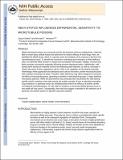Nek4 Status Differentially Alters Sensitivity to Microtubule Poisons
Author(s)
Doles, Jason D.; Hemann, Michael
DownloadHemann_Nek4 status.pdf (1.771Mb)
OPEN_ACCESS_POLICY
Open Access Policy
Creative Commons Attribution-Noncommercial-Share Alike
Alternative title
Nek4 Status Differentially Alters Sensitivity to Distinct Microtubule Poisons
Terms of use
Metadata
Show full item recordAbstract
Microtubule poisons are widely used in cancer treatment, but the factors determining the relative efficacy of different drugs in this class remain obscure. In this study, we identified the NIMA kinase Nek4 in a genetic screen for mediators of the response to Taxol, a chemotherapeutic agent that stabilizes microtubules. After Taxol treatment, Nek4 promoted microtubule outgrowth, whereas Nek4 deficiency impaired G2-M arrest and decreased formation of mitotic-like asters. In contrast, Nek4 deficiency sensitized cells to vincristine, which destabilizes microtubules. Therefore, Nek4 deficiency may either antagonize or agonize the effects of microtubule poisons, depending on how they affect microtubule polymerization. Of note, Nek4 gene maps to a commonly deleted locus in non-small cell lung cancer. Thus, Nek4 deletion in this disease may rationalize the use of particular types of microtubule poisons for lung cancer therapy.
Description
2011 February 1
Date issued
2010-02Department
Massachusetts Institute of Technology. Department of Biology; Koch Institute for Integrative Cancer Research at MITJournal
Cancer Research
Publisher
American Association for Cancer Research
Citation
Doles, J., and M. T. Hemann. “Nek4 Status Differentially Alters Sensitivity to Distinct Microtubule Poisons.” Cancer Research 70.3 (2010): 1033–1041.
Version: Author's final manuscript
ISSN
0008-5472
1538-7445